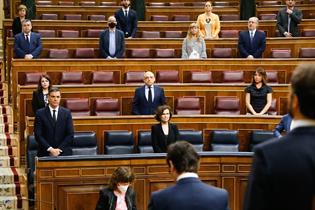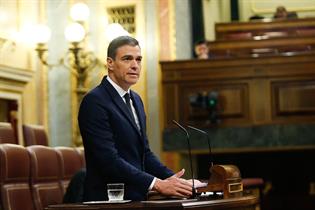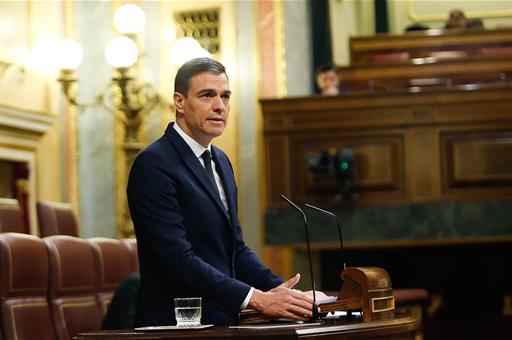COVID-19 coronavirus
Pedro Sánchez defends final extension to state of emergency in order to "bring all territories into the new normal"
President's News - 2020.6.3
Lower House of Parliament, Madrid
During a debate on the authorisation for the sixth extension to the state of emergency aimed at managing the coronavirus crisis, the President of the Government said that the data show "we have overcome the worst of the pandemic that is ravaging the world" thanks to the efforts and stamina of Spanish society as a whole.
Pedro Sánchez also gave a "positive balance" of the de-escalation. He said "the easing of restrictions and the measures applied in the various phases have had no negative impacts on the spread of the pandemic thus far". However, he went on to say that "the virus is still circulating among us" and it is therefore necessary to remain cautious by modulating social restrictions, limitations on movement and the gradual resumption of economic activity based on scientific recommendations and the health status of each region. "There is no choice between health and business. Without public health, no business could stay open to the public", he said.
Since the World Health Organisation (WHO) declared a coronavirus pandemic on 11 March, he said that the Government of Spain has focused on "saving lives to save the life of our country". The President of the Government stressed that a State ceremony will be held in memory of the victims and said that the official figures, drawn up using information provided by the regional governments and according to WHO parameters, put the number of dead at 27,127. As regards the data fluctuations during the course of the emergency, Pedro Sánchez called for decentralised management to be compatible with harmonised national statistics.
State of emergency, essential in fighting the pandemic
The President of the Government stressed that the state of emergency has been "the fundamental tool for halting the pandemic" given that, with no vaccines or treatments available, governments around the world have had to resort to lockdown measures. The state of emergency has also been essential during the de-escalation. "That is why we are asking for this final extension, which, any set-backs aside, will take us to a time when the vast majority of Spaniards will be close to the new normal", he said.
 The President of the Government stressed that the only goal for the state of emergency has been to control the virus, that it is an instrument provided to the State by the Spanish Constitution and that all freedoms have remained in place since it was passed.
The President of the Government stressed that the only goal for the state of emergency has been to control the virus, that it is an instrument provided to the State by the Spanish Constitution and that all freedoms have remained in place since it was passed.
He said that the Ministry of Health will continue to adopt the measures provided for under the state of emergency and the Plan for a Transition to the New Normal in those regions in phases 1 and 2 during the new extension in co-governance with the regional governments. In those regions currently in or passing into phase 3, the president of the regional government in question will decide on whether to maintain or amend the measures associated with this phase and the next steps towards the new normal.
Royal Decree-Law for the new normal
Pedro Sánchez said that regional governments never lost power over healthcare management at any time and that, from phase 3 onwards, they will also have absolute decision-making powers, with the only exception being restrictions on the freedom of movement, which will depend on the Minister for Health.
The goal for this "final" extension to the state of emergency is "to bring all regions into the new normal", said Pedro Sánchez, who went on to announce that the Council of Ministers on 9 June will approve a Royal Decree-Law for the new normal with all the prevention, containment and coordination measures required to deal with the healthcare crisis caused by COVID-19 following the end of the state of emergency.
The measures will be discussed at the Inter-regional National Health System Council, which is made up by the Government of Spain and the health councils of the regional governments. The Royal Decree-Law will contain all the health measures that must be observed until an effective vaccine or treatment becomes available, "enabling us to return to our previous habits with complete peace of mind and therefore prevent the risk of a new outbreak of the pandemic", he said.
Favourable proposal for Spanish interests
In his speech to the plenary session, Pedro Sánchez also highlighted "the leadership role" played by Spain within the framework of the European institutions, an "absolutely fundamental" field for the economic and social reconstruction of Spain on sound, sustainable and inclusive foundations.
He explained that, according to estimates from the European Commission, Spain could benefit from some 77 billion euros in direct transfers and some 63 billion euros in loans. Some 140 billion euros in total, which represents a "favourable proposal for our interests, whichever way you look at it, both in terms of the amount and the conditions under which it is offered", he said.
This proposal will be debated at the European Council on 19 June and will be resumed, foreseeably for final approval, together with the Multi-annual Financial Framework 2021-2027, at an extraordinary and single-subject European Council to be held in July, said the President of the Government. He went on to add that, should it be achieved, there would be margin for setting up a transition fund of almost 12 billion euros and the first debt to be issued during the final quarter of the year.
Safety net and strategic plans
 "In 1948, the United States saved a Europe devastated by the Second World War, but nobody saved Spain, destroyed by its own civil war. Today, in 2020, Europe has to save Europe. And Spain, within the framework of Europe, has to save Spain", said Pedro Sánchez.
"In 1948, the United States saved a Europe devastated by the Second World War, but nobody saved Spain, destroyed by its own civil war. Today, in 2020, Europe has to save Europe. And Spain, within the framework of Europe, has to save Spain", said Pedro Sánchez.
The President of the Government went over the main measures adopted to protect families, workers and companies, and stressed that the Government of Spain will continue to act in order to offer "certainty and security" so nobody is left behind. Dealing with the most vulnerable Spain is precisely the goal for the Minimum Living Income approved last week, said Pedro Sánchez, who added that it will enhance inclusion and help the economy as well as reduce severe and child poverty.
The President of the Government argued that the social reconstruction process must be accompanied by an economic reconstruction and announced that the Government of Spain will impact certain strategic sectors. On the one hand, it will soon reveal a Tourism Relaunch Plan based on economic and employment support measures of a complementary nature to those already announced and on repositioning Spain as a "safe and sustainable destination".
On the other hand, the Government of Spain is working on a "major mobility and automotive sector reactivation plan" that will include actions to support the automotive industry throughout the value chain in order to enable a swift recovery and promote a transition to cleaner, more sustainable vehicles.
Pedro Sánchez said that the goal is to facilitate an economic transformation towards a sustainable model capable of creating quality, for which the Government of Spain will employ social dialogue to work on producing a Workers' Statute for the 21st Century.
A desire for understanding
The President of the Government called on parliamentary groups to reach an agreement on the reconstruction process with urgency, responsibility and a spirit of harmony, "all pulling in the same direction". He added that different models co-exist in the Lower House of Parliament. Sometimes, these models disagree on the concept of country and its future, "but they are all Spain".
Now is the time to show the people how politics and understanding can be useful, said Pedro Sánchez, calling for the "poison of hatred" to be rejected, as well as all forms of violence, insults and provocation.
"We do not want that for ourselves or our children. Our parents didn't sacrifice so much for that", he concluded.
Non official translation





